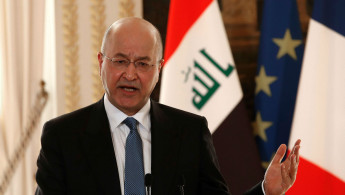Iraq denies involvement in attacks on Saudi Aramco oil facilities claimed by Yemen's Houthis
Baghdad has denied any involvement in the drone attack on Saudi Arabia’s Aramco oil facilities on Sunday, after comments made by US secretary of state suggested Yemen’s rebels were not to blame.
"Iraq denies what some media have reported on the use of its territory to attack Saudi oil installations by drones, and confirms its constitutional commitment to prohibit the use of its territory for aggression on its neighbours, brothers and friends," an official government statement said.
The government formed a committee to follow up on developments, the statement added, calling on all factions to halt attacks that cause grave harm and loss of life.
“The Iraqi government affirms solidarity with its brothers and expresses its concern that escalation and military solutions complicate the humanitarian and political situation and threatens our common security, as well as regional and international security,” the statement read.
“Iraq renews its call for a peaceful solution in Yemen, the protection of lives of civilians and the preservation of the security of the brotherly countries. It calls on the countries of the world, especially the countries of the region, to shoulder their humanitarian and moral responsibility and to undertake initiatives that put an end to this war, which is not profitable, and results in great human casualties and destruction of infrastructure,” it added.
The comments came after US Secretary of State Mike Pompeo blamed Tehran for the pre-dawn attack, which was claimed by Yemen’s rebel Houthi movement.
Pompeo said that there was no evidence that the attacks, which targeted the key Aramco facilities of Abqaiq and Khurais in eastern Saudi Arabia, were launched from Yemen.
"Iran has now launched an unprecedented attack on the world's energy supply," Pompeo tweeted.
"The United States will work with our partners and allies to ensure that energy markets remain well supplied and Iran is held accountable for its aggression," the top US diplomat added.
The drones triggered multiple explosions, forcing the state-owned Saudi Aramco oil company to temporarily suspend production at the two facilities and interrupting about half of the company's total output, Saudi Energy Minister Prince Abdulaziz bin Salman said.
The attack came ahead of a much-anticipated listing of Aramco stocks on global markets.
Iran's foreign ministry on Sunday dismissed as "meaningless" the US accusations that it was behind the attack, suggesting they were a pretext for military action against Iran.
"Such fruitless and blind accusations and remarks are incomprehensible and meaningless," ministry spokesman Abbas Mousavi was quoted as saying in a statement.
The allegations over Saturday's strikes were meant to justify "future actions" against Iran, he added.
However, an Iranian Revolutionary Guards commander said on Sunday that American bases and aircraft carriers were within range of Iranian missiles, suggesting his country would be prepared for war.
"Everybody should know that all American bases and their aircraft carriers in a distance of up to 2,000 kilometres around Iran are within the range of our missiles," the head of Iran's Revolutionary Guards Corps Aerospace Force, General Amir Ali Hajizadeh, said, according to Iran’s semi-official Tasnim news agency.
"Iran has always been ready for a full-fledged war," he added.
Earlier this year US officials said they had evidence that attacks on Saudi oil facilities claimed by Yemen's Houthis in May were in fact launched by Iran-backed militants in Iraq.
Meanwhile, a Yemen expert told The New Arab the Saudi mismanagement of the Yemen conflict has played into the hands of Iran.
"The problem is that we are stuck in the blame game. The Saudis have completely mismanaged the war in Yemen and so have left themselves exposed. They let the UAE take the lead but all the UAE has done is fuel internal divisions in Yemen, playing right into the hands of the Houthis, and, consequently Iran,” she said on condition of anonymity,
"Trump has escalated rhetoric and economic sanctions on Iran. But beyond that, both the US and Saudi Arabia have been pretty much reactionary and not strategic in the way they dealt with Iran," she added.
Follow us on Twitter: @The_NewArab





 Follow the Middle East's top stories in English at The New Arab on Google News
Follow the Middle East's top stories in English at The New Arab on Google News


